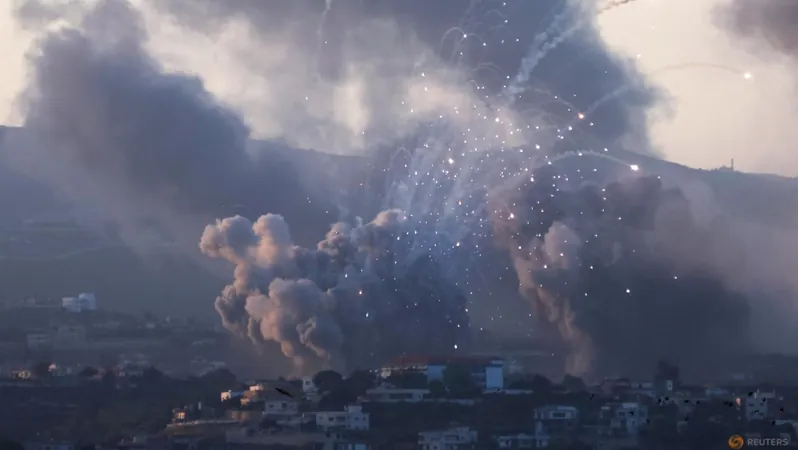
Israel Intensifies Airstrikes on Hezbollah in Lebanon: Residents Urged to Evacuate
2024-09-23
Israel Intensifies Airstrikes on Hezbollah
In a dramatic escalation of military action, Israel has ramped up airstrikes against Iranian-backed Hezbollah, targeting key locations across southern Lebanon, the eastern Bekaa Valley, and northern regions near Syria. Israeli Defense Minister Yoav Gallant has reassured the public, stating that their attacks are necessary to ensure the safe return of residents in northern Israel to their homes.
"This is just the beginning of a deeper campaign against Hezbollah, and our operations will persist until we successfully achieve our objectives," Gallant declared in a video statement released on September 23. He emphasized the need for the Israeli public to remain calm during these tense times.
Urgent Evacuations and Psychological Tactics
Israeli military spokesperson Avichay Adraee indicated that airstrikes were imminent, specifically targeting locations where Hezbollah is believed to be concealing weapons within civilian structures. In a concerning development, residents in southern Lebanon reported receiving alarming calls urging them to evacuate areas near Hezbollah installations, with a recommendation to move at least 1,000 meters away.
Lebanon's Information Minister Ziad Makary dismissed the evacuation calls as a psychological tactic, insisting that the ministry would not comply with such orders. "This is merely an attempt to unsettle the population," Makary asserted, reflecting the complexities of the ongoing conflict.
Israel's Approach and Possible Ground Invasion
The Israeli High Command reiterated these warnings, broadcasting messages in Arabic across various media platforms in Lebanon. Rear Admiral Daniel Hagari, a military spokesperson, stated that Israel would consider all necessary actions—potentially including a ground invasion—to safeguard the vulnerable northern communities in Israel.
Heightened Conflict Amid Ongoing War with Hamas
This latest wave of Israeli attacks marks one of the most intense periods of conflict witnessed amid the ongoing war with Hamas in Gaza. On Monday morning, Israeli fighter jets executed a series of strikes against towns along Lebanon’s southern border, with reports of extensive damage and casualties. An uninhabited mountainside near Byblos also sustained a rocket hit, marking a significant escalation in the geographical scope of the conflict.
Eyewitnesses in Tyre noted the relentless sound of warplanes, accompanied by reports of airstrikes in various regions, including the Bekaa Valley and Hermel, where at least one person was killed and multiple others injured.
Discussions with U.S. Defense Secretary
In talks with U.S. Secretary of Defense Lloyd Austin, Gallant discussed the immediate threats posed by Hezbollah and provided a comprehensive overview of Israel's military operations aimed at minimizing Hezbollah's capacity to launch attacks against Israeli civilians. They also deliberated over the broader threats in the region, particularly those emanating from Iran and its proxies.
Hezbollah's New Phase of Conflict
Amid the rising tensions, Hezbollah's deputy leader, Naim Qassem, indicated a shift in the group's strategy, announcing a "new phase" in the conflict, which he termed an "open-ended battle of reckoning." The group's recent actions, including retaliatory rocket fire into northern Israel, signal a determination to confront the escalated Israeli military campaign.
Concerns Over Civilian Safety and Regional Stability
As the situation continues to unfold, both Israel and Hezbollah remain deeply entrenched in a cycle of violence, with the potential for further degradation of regional stability. Concerns over civilian safety in both Lebanon and northern Israel are growing as the conflict unfolds, leaving many to wonder how much longer this escalation can continue before it reaches a critical breaking point.



 Brasil (PT)
Brasil (PT)
 Canada (EN)
Canada (EN)
 Chile (ES)
Chile (ES)
 España (ES)
España (ES)
 France (FR)
France (FR)
 Hong Kong (EN)
Hong Kong (EN)
 Italia (IT)
Italia (IT)
 日本 (JA)
日本 (JA)
 Magyarország (HU)
Magyarország (HU)
 Norge (NO)
Norge (NO)
 Polska (PL)
Polska (PL)
 Schweiz (DE)
Schweiz (DE)
 Singapore (EN)
Singapore (EN)
 Sverige (SV)
Sverige (SV)
 Suomi (FI)
Suomi (FI)
 Türkiye (TR)
Türkiye (TR)